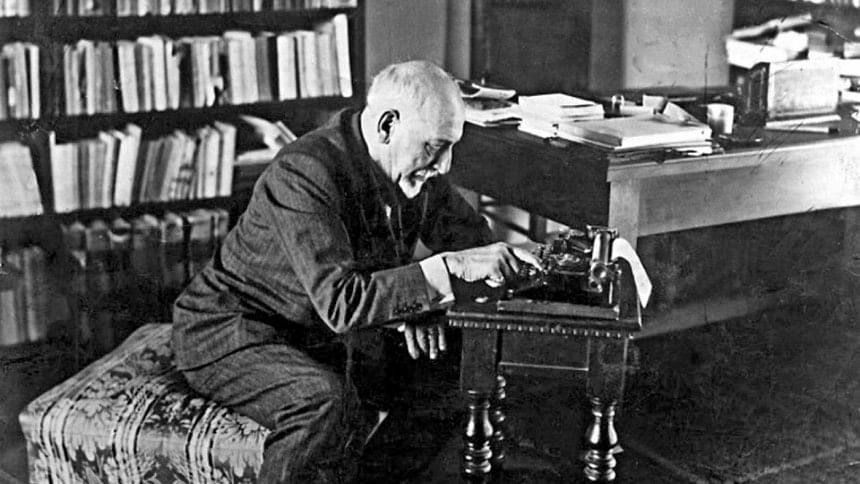Luigi Pirandello

Luigi Pirandello is not a very familiar name among our mainstream theater practitioners, for as far as my memory goes, none of his plays have been translated and staged in Bangladesh so far. Pirandello is an Italian playwright, novelist, poet and short story writer. He wrote his plays, poems, novels and short stories during early part of the last millennium. It was a turbulent time socially, politically and economically.
By the time Pirandello started writing his plays, Henrik Ibsen had created a great impact in the European social scenario, by writing Ghosts and A Doll's House—which are still marked to be the beginning of the portrayal of realism on the stage. The idea of his realism expanded fast all over Italy, Spain, England, France and Russia—though each country had exclusive view points and interpretations of the term nurtured by its existing social, political and economic conditions.
Two major historical events of that time influenced Pirandello's mindset—First World War (1914-1918) and Russian Revolution (1917). Added to that was the incidence of Mussolini's coming to power. Mussolini's National Fascist Party ruled Italy between 1922 and 1943. Though Pirandello died in 1936, three years before the beginning of the Second World War, Mussolini's Fascist dictatorial ideas and his aligning with Hitler, started to be distinctly felt in the social and political realms of Italy. Pirandello became a victim of that, not by opposing it, but by supporting Mussolini. History has it that all political ideologies need support and endorsements from so called intelligentsia—in Italy at that time, Pirandello happened to be one such exerting intellectual, and he was readily picked up by Mussolini to validate his political ideologies. This happens to be the storyline of a bioplay by Chandan Sen, titled Pirandello O Puppeteer—in this case, Mussolini being the puppeteer. The play is directed by Arup Rai.
Chandan Sen has penned a few other bio-plays too and quite successfully for that matter. I saw the play in Kolkata during my recent visit there—the lone play that I managed to witness in that trip of mine! Seeing the play, I could parallel Pirandello's situation with many of our so called men of letters; who either for their survival, (!) or for gaining status in society, supported many of our previous dictators and brought shameful disaster in their lives. Intellectuals of this kind still abound in our society. But one thing is true: none of them were or are as talented and commendable as Pirandello was!
Overall, I did not like Chandon Sen's play very much, for it contained more words than actions. I may sound traditional, but I strongly hold that in a play, if it genuinely claims to be a play, words need to be put skillfully and aesthetically to action or how come it is a performing art! Most part of Chandan's play is mere narrative of Pirandello's life.
The other thing is its authenticity. It is a bioplay, and bios, be they fictions, motion pictures or plays, are difficult zones for the writers/playwrights/directors to traverse with steady footing—for they have to tactfully mingle their imaginations with real facts after much deliberations. In the play, Chandan Sen showed that Pirandello had a very unhappy life with his parents—his father was a downright materialistic person who could do anything for his worldly gains. He even extorted dowry from his in-law by torturing his wife to finance his business. He never liked his son's writing poetry or turning his back on so called life that he preferred. Pirandello loved his mother as much as he hated his father—which the playwright used as Pirandello's Oedipus complex. I did a little research on Pirandello after seeing the play and I traced no such hint in his biography—though it is true that his father took dowry from his in-law to invest in his business.
One intriguing finding of mine is both Rabindranath and Romain Rolland (French dramatist, novelist, essayist, art historian, mystic, and also a long time good friend of Rabindranath) supported Mussolini's political views, although Rabindranath later denounced it in black and white. Luigi Pirandello too, at the far end of his life, condemned the ideologies of Mussolini's National Fascist Party and formally announced his resignation from it. This can be cited as a good example for our so called intellectuals to follow.
The writer is an educationist teaching English Language & Literature at Central Women's University. He is also a Bangla Academy awardee for translation.

 For all latest news, follow The Daily Star's Google News channel.
For all latest news, follow The Daily Star's Google News channel. 



Comments